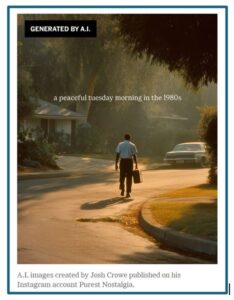Lately, I have seen too many cats smoking cigars and dogs playing poker.
Pardon me for saying the obvious. But it is no longer possible to trust photos we routinely see on many internet platforms. Perhaps I am the last to notice, but a combination of photo-shopping and animation has begun to make it a challenge to tell the difference between the real and the fake. Lately, I have seen too many cats smoking cigars, dogs playing poker, and a preschooler performing Shostakovich. A.I.-produced photos and videos have gotten that good. A few days ago I saw an image of the President playing golf, but looking mighty wide from the back. The photo suggested that seat belt extenders would definitely be a required item on Air Force One. That picture was probably photoshopped, much like what his own team does when he shows up in a meme that would be an eight-year-old’s idea of an action figure.
Fast Food Worker From the Feline Community
byu/ZashManson inaivideo
As in the above example, some images are too cute. But it must be getting harder for photo editors in various news organizations to verify less playful images that come their way. That’s one advantage to keep photojournalists on staff. By contrast, social media represents the equivalent of the wild west. Too many people are willing to ignore the courtesy of sincere veracity that would have been honored even a generation ago.
If we already live in a world where fantasies are mistaken as fact, what are we to do with the age-old axiom that “seeing is believing?” We all recognize the obvious giveaways in classic animation and set-ups like the above example of a feline fast food worker. It is quite another thing to conceal artificial creations about subjects that matter in photorealistic material. Apparently, our non-literate President has already been deceived by “news” videos of indeterminate origin passed on by others; Trump gorges on his preferred medium of images.
There are folks on YouTube who have tried to show how a fake can be recognized. I appreciate their efforts. But short of seeing a third arm on a person, I often miss the ostensible giveaway in a fabricated piece. And there appears to be no uniform or emerging norms for labeling a counterfeit picture or a video.
Of course the larger context here is that hand-wringing over hybrid kinds of media is not new. Critics and theorists have debated for some years about the authenticity of all sorts of arts that are easily reproduced. A classic is Walter Benjamin’s 1935 essay, The Work of Art in the Age of Mechanical Reproduction. And there is the conductor and composer John Phillip Sousa, who claimed that the “canned music” of a recording debased the real thing. Add in the complexity that an estimated half of all social media content now is created by various forms of A.I. and we have a problem.
Many who have made a systematic study of the internet generally note that there has been a steady decline in authentic human-generated content. Again, this applies most directly to platforms like X, Facebook, and the like. A more recent transformation is video, where producers can add facsimiles of live action in convincing photographic detail.
Film and video have always been used to spin out fantasies that speak to our fears and desires. But it is a newer twist to mask the fake in reproductions that are plausibly real. Will newer generations have the skills to detect plausible but fanaticized reproductions? Can a culture function when source authenticity is always in doubt? More than ever need the solid anchor of conversing with people in real time and space.


 Researchers like Harvard’s Stephen Pinker note that a look at a lot of hard data reveals our world is now safer and less violent than in previous years (The Better Angels of Our Nature, 2010). The difference is the expansion of the personal boundaries of the known made possible by news sites and social media that have penetrated and been absorbed by the culture. Clearly, Americans think they are less secure. Their perceptions of violence and disruption penetrate our mediated spaces: from school shootings to the collapse of the social or physical infrastructures of whole communities.
Researchers like Harvard’s Stephen Pinker note that a look at a lot of hard data reveals our world is now safer and less violent than in previous years (The Better Angels of Our Nature, 2010). The difference is the expansion of the personal boundaries of the known made possible by news sites and social media that have penetrated and been absorbed by the culture. Clearly, Americans think they are less secure. Their perceptions of violence and disruption penetrate our mediated spaces: from school shootings to the collapse of the social or physical infrastructures of whole communities.